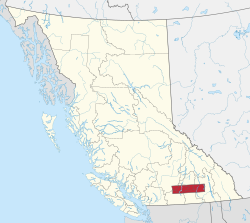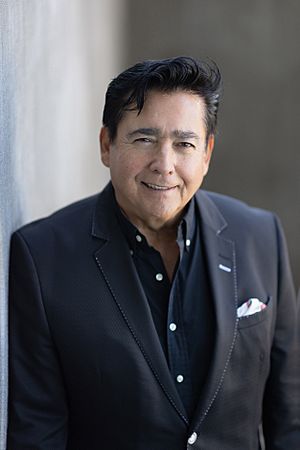Westbank First Nation facts for kids

Symbol
|
|

Westbank Statement of Intent boundaries
|
|
| People | syilx |
|---|---|
| Treaty | Westbank First Nation Self-Government Agreement |
| Headquarters | Westbank |
| Province | BC/BCE |
| Land | |
| Reserve(s) |
|
| Land area | 21.613 km2 |
| Population (2019) | |
| On reserve | 433 |
| Off reserve | 481 |
| Total population | 914 |
| Government | |
| Chief | Robert Louie |
| Tribal Council | |
| Okanagan Nation Alliance | |
| Website | |
| wfn.ca | |
The Westbank First Nation (Okanagan: Tqłəníw̓t/Sn̓qatqłəníw̓t) is a First Nations group in British Columbia, Canada. They are a self-governing band, meaning they make their own laws and decisions. They live in the Okanagan region and are one of eight groups that form the Okanagan Nation Alliance.
The Westbank First Nation (WFN) is led by a chief and four councillors. These leaders are chosen by WFN members every three years. The current chief is Robert Louie. As of 2019, WFN had 914 members. The Nation also provides jobs for more than 200 people.
Contents
How Westbank First Nation is Governed
The Westbank First Nation became a separate group in 1963. Before that, their lands were part of the Okanagan Indian Band. In 1990, they started working towards governing themselves.
On April 1, 2005, the Westbank First Nation officially became self-governing. This happened after a law called the Westbank First Nation Self-Government Act (Bill C-11) was approved.
After gaining self-government, WFN members created their own rulebook, called the Westbank First Nation constitution. This constitution explains how the community is run. It covers important things like how leaders are elected fairly. It also sets rules for managing money and making sure leaders are responsible. The constitution also includes rules for making new laws and managing their lands.
Advisory Council: Helping with Decisions
In 2005, the WFN Advisory Council was created. This council has five members. They are elected every three years by people living on WFN lands.
The Advisory Council meets regularly to discuss important issues. They give advice and make suggestions on things that affect taxpayers. This includes how money is spent and new laws. About 11,000 people who are not WFN members live on WFN lands.
Westbank First Nation Lands
The Westbank First Nation has a total land area of 5,340 acres. This land is divided into five separate areas. Two of their main lands are next to Okanagan Lake. These are also close to the City of West Kelowna. The other three land areas are on the east side of Okanagan Lake.
Here are the names of the lands under the Westbank First Nation:
- Tsinstikeptum Indian Reserve No. 9: This land is 641.8 hectares and is about 6 miles southwest of Kelowna.
- Tsinstikeptum Indian Reserve No. 10: This land is 339 hectares and is directly across from the City of Kelowna.
- Medicine Creek Indian Reserve No. 12: This land is 662.50 hectares and is about 10 kilometers southeast of downtown Kelowna.
- Medicine Hill Indian Reserve No. 11: This land is 515.70 hectares and is about 15 kilometers southeast of downtown Kelowna.
- Mission Creek Indian Reserve No. 8: This land is 2 hectares. It is located on the left side of Mission Creek, about 1 mile from Okanagan Lake and 2 miles south of downtown Kelowna.
See also
Images for kids
 | Laphonza Butler |
 | Daisy Bates |
 | Elizabeth Piper Ensley |



